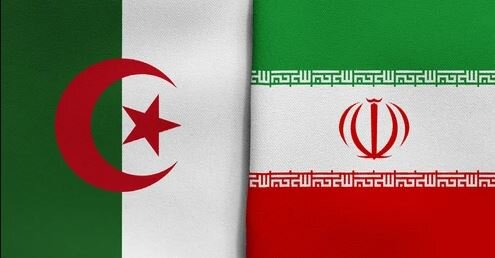MADRID – On April 8th, Iranian Foreign Minister Abbas Arakich arrived early at Houari Bhumien International Airport in Algiers, head of the political delegation. The visit is part of Tehran’s efforts to strengthen its diplomatic presence in key regions, along with its central goal of integrating bilateral relations with Algeria.
In the context of growth in geopolitical competition, the Islamic Republic is sought to solidify its relationship with the Maghreb’s strategic partners, with Algeria emerging as an important ally in this effort.
During his visit, Arakcci met with his Algerian counterpart Ahmed Atahf to discuss various aspects of bilateral relations and key regional and international challenges. For Iran, a direct assessment of capabilities and alliances in various geopolitical scenarios is essential to the defense and expansion of its strategic interests, and Algeria is an important pillar in this regard.
Iran and Algeria’s relationship was close until the early 1990s and until the early 1990s, when they played an important role in negotiating the release of hostages at the US embassy in 1981. However, tensions escalated following accusations that Iran was funding the Islamic Saving Front (FI), leading to the halt of bilateral relations between the two countries from 1993 to 2000. Algiers has reopened, especially in key areas such as energy and regional cooperation. The reconciliation reflects a renewed interest in strengthening the relationship between two countries, which share a common vision on international and regional issues despite past frictions.
The historical links between the two countries, characterized by decades of struggle for independence and resistance to colonialism, were key factors in this process of reconciliation. Iran’s Islamic revolution coincided with the early days of Algerian President Chadri Benjedid, but it encountered the enthusiasm of the Maghreb nation. Over the years, Algeria has played a key role as a mediator in key moments in recent history, including the US embassy in Tehran and the hostage issue.
Moreover, like Iran’s Islamic republic, Algeria believes that preserving its independence can only be achieved through strengthening internal sovereignty. In this context, the Maghreb countries have made continuous efforts to develop relationships with other countries that share this vision, highlighted by membership in organizations such as the non-aligned movement, the organisation of Islamic cooperation, and the Forum of Gas Exporting Countries. Like Iran, Algeria will maintain close cooperation with Tehran within the OPEC (organization of oil exporters) and emphasize the importance of mutual cooperation in key sectors such as energy, thereby strengthening their respective positions on the international stage.
This strengthening of bond is no coincidence, as Algeria consistently supports the Palestinian cause. Both Algerian French colonialism and Palestinian Zionism highlight how colonial times have relied on stereotypes about the wildness and primitiveness of native groups to justify oppression and occupation. Violence in this sense is presented not only as a tool of control but also as a “civilization” action, fulfilling the supposed moral superiority. In this context, both French colonialism and Zionism emerge as two aspects of the same coin. There, dehumanization and land confiscation are justified through the distorted stories of reality facing the occupied people.
The relationship between French colonialism and Zionism becomes even more evident when analysing the tactics used to dehumanize the Indigenous peoples. As expert Sarah Lanama points out, as France did during the colonial era, Israel relied on rape accusations to demonize its enemies. Recently, during protests calling for a ceasefire in Gaza, it has been revealed that Hamas used rape as a weapon of war. The lanamas of the story are associated with historical patterns. The idea that indigenous people are moral and sexually inferior, justifying both violence and land division.
In this context, the geopolitical competition between Algeria and its neighbor Morocco is highly relevant. Morocco normalized relations with Israel under the so-called “Abraham Accord” in 2020. This is a settlement that has sparked tensions in the region, particularly in light of the ongoing political conflict over the Western Sahara. A year ago, the Algerian government accused Morocco of sending Israeli intelligence reporting agencies and being said to be using Moroccan passports, accusing them of acting against Algeria’s stability and national security. For the Algerian government, which historically opposes Israeli policy, normalising relations with Morocco with Tel Aviv is seen as a step that can further destabilize the betrayal of regional solidarity and the already vulnerable balance of North Africa.
For Algeria, Israel’s growing influence in the region, coupled with Morocco’s reconciliation with Tel Aviv, represents a direct threat to Arab unity. This approach is also seen as a change in regional order, and could lead to long-term consequences on the political stability of the Maghreb. In this scenario, Algeria highlights the urgent need to maintain regional unity and stability, facing consideration of fragmentation projects driven by external forces.
It is therefore not surprising that Iran and Algeria, two countries that have converged their political vision on key aspects, are trying to strengthen their relationship through multiple paths. Both countries share a common strategic approach to preserving their sovereignty, resisting external influences, and defending the multipolar international order. In an increasingly biased global context, bilateral relations between Tehran and Algiers not only respond to immediate geopolitical interests, but also reflect a common vision of resistance to power dynamics dominated by Western powers. Founded on the principles of independence and regional solidarity, this collaboration highlights the growing importance of interstate alliances in line with the desire to reconstruct regional and international balances despite cultural and geographical differences.

